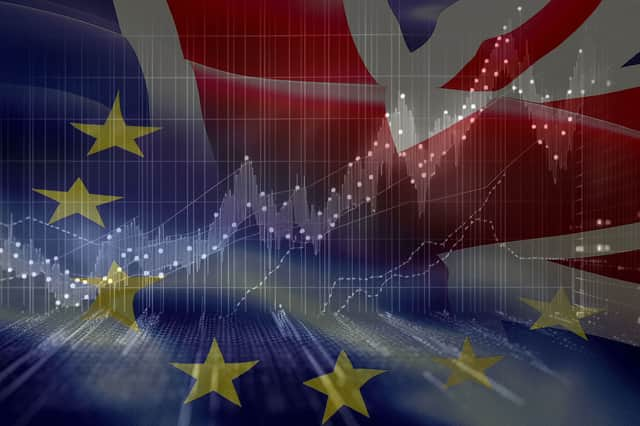Brexit: majority of voters blame leaving EU for fuelling inflation and record levels of immigration
and live on Freeview channel 276
A majority of Britons now blame Brexit for fuelling inflation and the cost of living crisis, as well as leading to record net migration, a new poll has shown.
The survey by Opinium, to mark the third anniversary of the UK officially leaving the EU, is the latest to find wide dissatisfaction with Brexit, from both sides of the debate. In this poll of 2,000 people, only 22% thought the exit has had a good impact on the UK, with 48% thinking it has had a bad impact.
Advertisement
Hide AdAdvertisement
Hide AdAnd people are now blaming Brexit for having a negative impact on their personal finances, the NHS and immigration. Almost two-thirds of respondents said Brexit has been a factor in sky-high inflation and the cost of living crisis, with only 7% saying it has kept down prices in shops.
While 54% of people think it has had a negative effect on the UK economy as a whole, with 13% saying it has had a good impact. The Office for Budget Responsibility has said that leaving the EU caused a 4% hit to GDP, which was bigger than Covid. This will be of concern to Brexit-supporting Prime Minister Rishi Sunak, with the cost of living crisis by far the biggest issue for voters according to all pollsters.
The second biggest concern is the NHS, and 46% of people thought Brexit has had a bad impact on our National Health Service - with just 9% believing it has had a good impact. And also worryingly for the Prime Minister, who has made reducing legal and illegal migration his main priority, 53% of respondents to the Opinium poll said that leaving the EU had reduced the ability of the UK to control immigration.


This comes after net migration to the UK hit a new record of 745,000 in December 2022, 561,000 higher than when the UK left the EU. Speaking to the Observer, James Crouch, head of policy and public affairs at Opinium, said: “Public discontent at how Brexit has been handled by the government continues, with perceived failings even in areas previously seen as a potential benefit from leaving the EU.
Advertisement
Hide AdAdvertisement
Hide Ad“More than half (53%) of leave voters now think that Brexit has been bad for the UK’s ability to control immigration, piling even more pressure on an issue the government is vulnerable on. Despite this, Brexit is likely to be a secondary issue at the next election compared to the state of the economy and the NHS, which are the clear priority for voters.”
This is backed up by findings from a survey and series of focus groups in May and June carried out by UK in a Changing Europe (UKiCE) and the consultancy Public First. It found people associate travel delays, increases in the cost of living and staff vacancies in health and social care to “some extent with Brexit”.
However, only 16% of Brexit voters would now vote to rejoin - despite more than half saying leaving the EU has either not turned out well or it’s turned out badly or very badly. They primarily blame Brexit going badly on UK politicians, such as Boris Johnson and Theresa May.
Sophie Stowers, research assistant at UKiCE, said that while people were tying "increasing food prices, staff shortages, travel delays" it was declining in salience amongst voters. "It’s interesting to see just how much we’ve moved to a situation where what was the defining issue of the day at the last election ... has gone to such little importance, according to polling.
Advertisement
Hide AdAdvertisement
Hide Ad"Quite a lot is made of the shift to rejoin/remain, but actually when we got under the skin of that question in focus groups … we actually found people said there was no appetite for that, they’re just not interested. When you ask them a binary question they will give you an answer, but they’re just not that interested - particularly leavers who would switch their vote."
The much promised Brexit dividends appear to be waning. The UK has rejoined the EU's Horizon science research programme after years in the wilderness, and just after Christmas the government announced it would not be bringing back imperial measures, despite Boris Johnson's promises. A whopping 99% of people were against them, however it still announced that pint-sized bottles of wine would be sold " thanks to new freedoms from leaving the EU".
Ralph Blackburn is NationalWorld’s politics editor based in Westminster, where he gets special access to Parliament, MPs and government briefings. If you liked this article you can follow Ralph on X (Twitter) here and sign up to his free weekly newsletter Politics Uncovered, which brings you the latest analysis and gossip from Westminster every Sunday morning.
Comment Guidelines
National World encourages reader discussion on our stories. User feedback, insights and back-and-forth exchanges add a rich layer of context to reporting. Please review our Community Guidelines before commenting.
